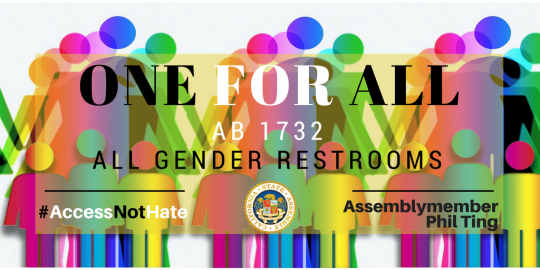
California bucks national trend of LGBT discrimination with “all gender” single-user restroom access
(SACRAMENTO, CA) – Governor Jerry Brown signed legislation authored by Assemblymember Phil Ting (D-San Francisco) establishing the nation’s most inclusive restroom access law among states.
Assembly Bill (AB) 1732 makes all single-user restrooms in California businesses, government buildings, and places of public accommodation universally accessible to all genders starting March 1, 2017. Sponsored by Equality California, the Transgender Law Center and California NOW, the bill stands in sharp contrast with 19 states this year that considered restricting access to restrooms, locker rooms, and other sex-segregated facilities on biological sex.
“California is charting a new course for equality,” said Ting. “Restricting access to single-user restrooms by gender defies common sense and disproportionately burdens the LGBT community, women, and parents or caretakers of dependents of the opposite gender. Bathroom access is a biological need. This law will ensure more safety, fairness, and convenience access for everyone.”
A 2013 study by the UCLA Williams Institute found 70% of transgender and gender non-conforming individuals face serious threats when using gender-specific restrooms. These threats include being verbally harassed, denied access or physically assaulted.
Brown’s signature of AB 1732 further solidifies California’s role as a national leader on transgender rights. In 2013, he signed AB 1266 to ensure transgender students at public schools may participate in gender-restricted school programs and use restrooms and locker rooms consistent with their gender identity. In 2011, Brown signed AB 887 to include “gender identity” and “gender expression” into California’s nondiscrimination laws.
AB 1732 passed the State Senate 28-7 and the State Assembly 57-18 in August. Here is what supporters say.
"North Carolina finds itself increasingly isolated, with its economy losing up to billions of dollars in cancelled conferences, sports events and concerts,” said Rick Zbur, Executive Director of Equality California. “Meanwhile, California has, with a minimum of controversy, moved in a different direction. We now have a policy that gives everyone greater privacy and safety in public restrooms - it, and not hateful laws in North Carolina, Mississippi and elsewhere, should be the model for the nation."
“Having access to facilities when they are most needed is important to our health,” said Jerilyn Stapleton, President of California NOW. “We shouldn’t have to wait or postpone having our needs fairly met in public. Everyone should experience equal waiting time. We have universal bathroom access at home and on airplanes so why not require it in public buildings?
“This law is a simple measure that will make everyone’s lives easier,” said Kris Hayashi, Executive Director of Transgender Law Center. “Having restrooms open to all genders will mean less hassle for everyone going about their day, and will allow people who don’t fit neatly into expectations of what it looks like to be male or female to use the restroom without fear of harassment.”
“This critical legislation expands the access rights we have in San Francisco to every county across our state,” said San Francisco Supervisor David Campos, author of San Francisco’s all gender restroom access ordinance. “This legislation will help ensure that all California residents, including LGBT individuals and people with disabilities, can use the bathroom in peace- without fear of harassment or discrimination.”
“For my whole life, public restrooms have been places of fear, anxiety, and danger for me – just because I don’t fit people’s expectations of what a woman should look like,” said Sara Rosenfeld, a 44-year-old woman from Berkeley. “As a queer, black, more masculine-looking woman, I am constantly questioned and harassed when I use the bathroom. AB 1732 is a simple but important law that would help cut down on the fear and harassment I face every day.”
“This bill increases access and safety for all,” said Somer Loen, President of the San Francisco Chapter of NOW. “Restroom restrictions have been justified to protect women but this is rooted in the antiquated idea that women need constant protection from the world outside of their doorsteps. To those defending inequality, women say ‘Not in our name.’”